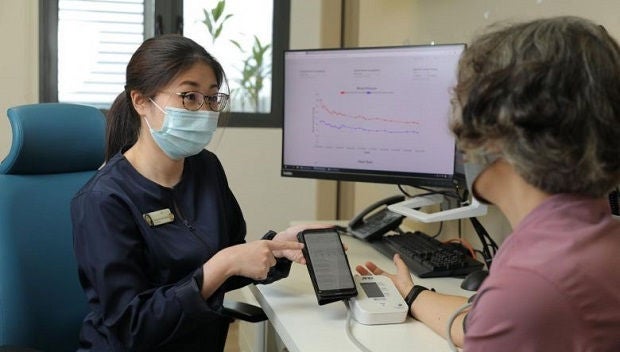
Ang Mo Kio Polyclinic care coordinator Hazel Yang showing Madam Tham Siew Yee how the app works. Patients like Madam Tham take their blood pressure readings at least once a week with a Bluetooth-enabled monitoring device, which automatically transmits the data to their polyclinic care team via the app. ST PHOTO: ONG WEE JIN
A telehealth programme for patients with high blood pressure is being rolled out by all three polyclinic clusters, enabling patients to monitor their blood pressure at home with the aid of a Bluetooth-enabled device that automatically transmits the readings to a care team as well as reduce their polyclinic visits.
The home blood pressure (BP) monitoring programme was rolled out at Ang Mo Kio (AMK) Polyclinic about two months ago and at Bedok Polyclinic last month. It will be available at Clementi Polyclinic in the first half of next year. Thereafter, each cluster will push it out to polyclinics under their care.
The roll-out is expected to be completed in about three years, Ministry of Health Office for Healthcare Transformation (MOHT) executive director Tan Chorh Chuan told reporters at AMK Polyclinic on Tuesday.
Patients in the programme will be given a Bluetooth-enabled device and be asked to download an app. They are to take their BP readings at least once a week with the device, which automatically transmits the data to the patients' polyclinic care team through the app. If their BP levels are not well controlled, they will receive chatbot alerts and tips on BP control. The app can also remind them to take their readings.
If needed, additional teleconsultation advice will be provided by their nurse and their medication may be adjusted. The app is in English, though the chatbot alerts are also available in Mandarin.
The programme costs $6.30 a month for the first two years, inclusive of the device and app subscription, and $7 a month for subsequent years.
A six-month pilot project, which started in September last year at AMK Polyclinic, showed that about 60 per cent of the 120 patients with uncontrolled BP at the start, and who used the telemonitoring service to track their BP levels at least once a week, achieved BP control. This compared with 52.6 per cent of the 120 patients in the group receiving the usual care, which involved making two to four physical visits a year to see the doctor.
Patients who sign up for this BP telemonitoring service will get a consult with the polyclinic doctor, and then a phone consultation with a nurse in six months' time, said Dr Valerie Teo, a family physician, consultant and deputy head of AMK Polyclinic. Only suitable patients will be enrolled, as those with diabetes and/or complex conditions who require closer monitoring are not suitable, she added.
Madam Tham Siew Yee, 65, is one of 250 patients who have enrolled in the programme since it was launched at AMK Polyclinic.
The retiree said it removed the need for manually recording her BP levels, which she used to do three times a day. Now, she checks her BP one to three times a week.
"The thing I find useful and comforting is that the reading is immediately uploaded and checked by a healthcare team behind the scenes on a regular basis. This means they don't need to review it only in three months, or six months or at my next appointment," she said.
Hypertension affects one in four Singaporeans aged 30 or older, and up to half have uncontrolled BP, which can lead to serious problems, such as stroke and heart failure.
The BP telehealth programme was the result of Primary Tech-Enhanced Care - a partnership between MOHT, National Healthcare Group Polyclinics, SingHealth Polyclinics, National University Polyclinics and Integrated Health Information Systems.
Going forward, the plan is to roll this out to general practitioners as well as introduce telehealth services for other chronic conditions, said Professor Tan.













 Get it on Google Play
Get it on Google Play